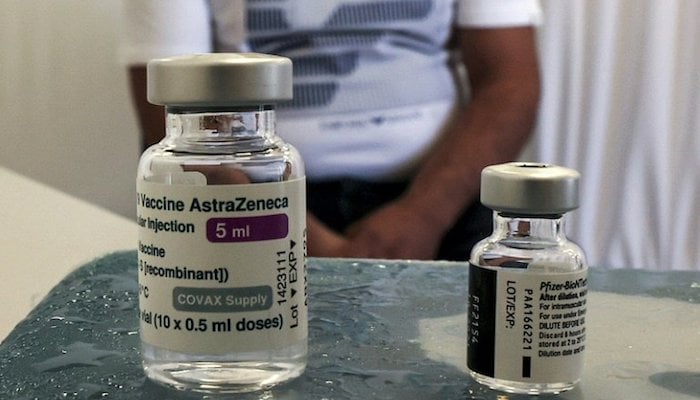[ad_1]
AstraZeneca’s Covid vaccine has been linked to a 30 percent increased risk of a very rare blood clot, compared to Pfizer’s, a large international study said Thursday.
Several countries have already changed their advice after previous research suggested that – in a small number of cases – thrombosis associated with thrombocytopenia (TTS) could be a possible side effect of Covid vaccines that use an adenovirus vector, or “engineered” virus. Like those from AstraZeneca and Johnson & Johnson.
Thrombocytopenia results in blood clots that can be life-threatening as levels of platelets — the tiny cell fragments in the blood that prevent bleeding — drop.
The new study, published in the BMJ, was the first to compare rates of thrombocytopenia between adenovirus and mRNA vaccines — such as Pfizer’s — across several countries.
The international research team analyzed the health data of more than 10 million adults in France, Germany, the Netherlands, Spain, the United Kingdom and the United States who received at least one vaccine dose between December 2020 and mid-2021.
In Germany and the UK, they matched data for 1.3 million people who took a first dose of AstraZeneca with 2.1 million people who took Pfizer.
A total of 862 cases of “thrombocytopenia” were recorded in the 28 days after the first dose of AstraZeneca, compared with 520 cases for Pfizer, the study said.
This means that the AstraZeneca vaccine has a 30% higher risk of developing thrombocytopenia than Pfizer.
However, when it came to the second dose, there was no additional risk among any of the vaccines.
The study was observational, which means it cannot show cause and effect. But the researchers said that additional analysis found the results consistent.
These risks, while very rare, “must be taken into consideration when planning more immunization campaigns and developing vaccines in the future,” the study said.
“Safe and effective”
Sarah Pitt, a microbiologist at Britain’s University of Brighton who was not involved in the research, said the “well-designed” study adds to the data showing that all vaccines are safe and effective.
She told AFP that the “extremely rare” cases of thrombocytopenia occurred after only 0.04 percent of vaccine doses in Germany and the United Kingdom.
She added that most countries were already avoiding the use of Covid adenovirus vaccines for older age groups and the most vulnerable youth.
European countries have largely pivoted towards mRNA vaccines. The AstraZeneca strike was never authorized in the US, which limited the use of the Janssen (Johnson & Johnson) COVID-19 strike to certain individuals earlier this year
However, the AstraZeneca and Johnson & Johnson vaccines play a pivotal role in the global Covax vaccine distribution scheme, which provides doses to low-income countries.
[ad_2]
Source link

